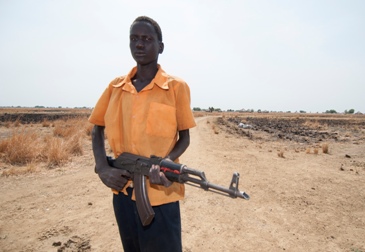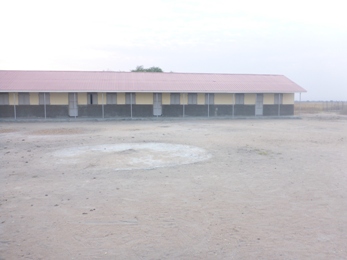FEATURE: Turning youth off guns and back to the books
April 6, 2015 (BOR) – Several fatal attacks and cattle raids on Biar Mabior Dau’s village in South Sudan’s Jonglei state by suspected ethnic Murle tribesmen led hime to take up the gun while still in his early teens.

In an interview with told Sudan Tribune last month, he said the only thing he trusted was his AK47, which he says has become central to his life in the absence of his father.
“In this world, I don’t trust anybody but my gun. Anything that I see with my own eyes is always counted [as] death,” he said following his return from the bush where he was herding cattle. “So my prayer to God is to let me see my enemy first,” he added.
Although his fellow villagers practice communal herding, Dau said he had decided to look after his own cattle in the bush while grazing after losing some in a series of raids two years ago.
“I am now keeping my cattle left to me by my father, although I lost some twice in [a] general cattle raid two years ago, I still have a good number to live on,” he said.
GRADUATING TO THE FRONTLINE
Dau inherited the cattle and a gun five years ago, by the virtue of being his father’s eldest son.
He said carrying a gun allowed him to defend his cattle and his territory from attacks.
He took part in live comabt on four occasions between 2012 and 2013, helping drive back attackers during clashes in Maar and Palieu.
Before leaving school Dau had been attending afternoon gun coaching sessions and would use trees at different distances as target practice.
“At first, I could not see where the bullets went after firing, but my seniors advised me to keep an eye open,” he said.
“After some days I could see the bullets. Then I went on and on until I rarely miss[ed] my targets placed at 50, 100, 150 and 200 metres and even more,” he added.
Dau said he undertook training to be prepared in the event of an attack when he would be deployed as part of additional forces when the fighting intensified. That meant he could only take part when the attackers had overran cattle herders on the frontline.
However, he later decided to move into the first row of fighters after an attack in October 2013 which left almost 80 villagers from his area dead.
This was against the wishes of his older cousins who wanted him to remain in a supporting role during clashes, but Dau said he felt adequately prepared enough given his fitness and accuracy with the gun.
“In that side where I fought very few cattle were taken by the raiders,” he said.
“Five days later we found more than 100 men, all from Murle, dead in the place where we fought them between Palieu and Maar,” he added.
NO SUPPORT TO RETURN TO SCHOOL
However, recent circumstances have led Dau to re-evaluate his decision to take up arms. His cattle herd has been hard-hit by disease and although he declined to reveal how many head of cattle he still had, he said he’d lost 11 cows since last December.

“I used to think about my gun every time. I had never left it when I moved, but this is changing slowly now. If I go to school now I would begin from primary seven,” he said.
“My mother can look after [the] cattle around our homestead during the day. The biggest challenge is that I have no money to support myself at school,” he added.
Uniforms, exercise books, pens and other school accessories are among the items students are expected to pay for at Dau’s village school.
At the time he left school uniforms cost just 30 South Sudanese pounds, but prices have since risen to more than 100 SSP.
Through micro-agriculture projects introduced by the Catholic Relief Service (CRS) in his village, Dau has acquired vegetable seeds, which he has planted around the water pan near his village. He hopes to raise enough crops to fund his studies for one year.
“When I thought of where to get money, since I have no cows to sell, I decided to get registered as one of the vegetable farmers,” said Dau, who is among a group of villagers now using the water from the pan to irrigate their fields.
“If we get the market after harvesting, I shall use the cash to help myself in school,” he continued.
He said he also hoped to secure charitable support in the future to help him pursue a better education outside his village.
Several young men of Dau’s age who left school early are now making a living working as shoe shiners or turn-boys in public buses, with others resorting to stealing and petty crime.
Encouraging these young people to return to school and continue their studies remains among ongoing challenges facing the government and parents.
(ST)
